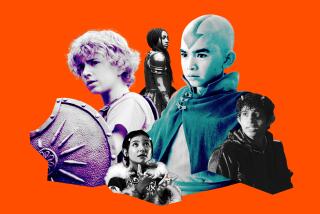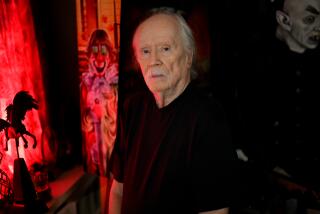Will Two ‘Casper’ Projects Come Back to Haunt Him?
- Share via
Cruise. Hanks. Ford. Schwarzenegger.
In Hollywood, the most highly paid movie stars are such instantly recognizable icons that one name says it all.
Now it’s time to add a new moniker to the list: Casper, as in Casper the Friendly Ghost. After languishing in obscurity for years, the cartoon character emerged in 1995 as a formidable box-office attraction with the film “Casper,” earning nearly $1 billion in worldwide theatrical, video and merchandising income.
Now Casper is so popular that he will star in not one but two sequels. In 1999, Amblin Entertainment and Universal Pictures will release their second “Casper” film in theaters. But first, there will be a $10-million direct-to-video film, “Casper, A Spirited Beginning,” due this fall, not from Universal but from Saban Entertainment and 20th Century Fox.
Direct-to-video sequels have become popular in recent years, especially Disney’s “Aladdin” sequels and Universal’s “Land Before Time” series. But no one has tried the risky strategy of returning to theaters with a high-profile film after the release of a low-cost direct-to-video sequel.
Fox Home Video is expected to announce today that its “Casper” video will feature such stars as Steve Guttenberg, Rodney Dangerfield and Brian Doyle Murray, with James Earl Jones and Pauly Shore providing voices for two ghost characters.
“The video marketplace is already three times bigger than the theatrical box office,” says Jeff Montgomery, the 32-year-old chairman of Harvey Entertainment, the company attempting to revitalize such Harvey Comics characters as Casper, Richie Rich and Baby Huey.
“If you can feed that demand with brand-name family films, you’re opening up a whole new realm of entertainment possibilities.”
But what has Hollywood insiders talking is this: Why would Universal, which had “Casper” sequel rights and had originally owned 20% of Harvey Entertainment, allow Fox-Saban to walk off with the potentially lucrative direct-to-video sequel rights?
Lucrative is no overstatement. “Casper’s” home-video release earned $325 million, while its worldwide box office totaled $307 million and merchandising brought in nearly $300 million.
“For a company trying to compete with powerhouses like Disney in the global entertainment business, it was an awful bonehead move,” says a rival film executive. “Think about what Disney’s done with ‘101 Dalmatians’ and ‘Cinderella.’ [Warner Bros.’] Bugs Bunny is on a postage stamp. But Universal didn’t seem to understand the value of a brand-name character. Now they’ve lost control of the franchise.”
At first, Universal pursued Casper with enthusiasm. When Montgomery bought Harvey Comics in 1989, Universal was his only real competitor. Even after the studio lost out on the purchase, Tom Pollock, then-chairman of Universal’s motion picture group, invested $3 million in Montgomery’s new company.
“We did the deal with Harvey Entertainment to get more characters for Universal,” recalls Pollock, who left the studio before Montgomery began renegotiations there. “We believed that if we showcased the character in a good movie, we could reinvent Casper for a new generation of moviegoers.”
Universal paid $750,000 to acquire the rights to a Casper film and any theatrical sequels, but Montgomery says the studio never owned the rights for a direct-to-video release. When the original deal was made, there was no interest in the direct-to-video market, which was dominated by pornography and grade-Z action movies.
When Montgomery met with Universal in 1996 to negotiate the direct-to-video rights, he expected the studio, which had made $300 million from the original film, to treat Casper like a bona fide movie star. Instead, the new Universal executives he met with--corporate operations chief Howard Weitzman and the now-departed executive vice president Sandy Climan--seemed uninterested or unwilling to make a substantial offer.
“They had just had a change in management, and I guess our project fell through the cracks,” Montgomery says. “They weren’t willing to make the necessary commitments to us.”
Sources close to the negotiations say the Universal brass wasn’t eager to expand on a partnership negotiated by a previous regime. “Instead of taking care of business by wooing Montgomery, they got involved in politicking,” says one Harvey Entertainment ally. “If you knew you wanted to make a theatrical sequel, it was crazy not to tie up the DTV rights too.”
Universal executives say Montgomery wanted the studio to form a joint venture with Harvey, asking for $100 million for half his company. Universal viewed the price as unreasonable and backed away from doing a more limited direct-to-video deal as well. “It was a straight business decision,” Weitzman says. “Harvey wanted more money than we were willing to pay.”
Montgomery turned to Fox and Saban, who are partners in the Fox Kids Network. “They got the deal,” he says, “because they moved faster than any of their competitors.” The Fox Kids Network was already airing the animated “Casper” TV series, providing a convenient cross-promotional tie-in.
Saban, which made its name with the Mighty Morphin Power Rangers, guaranteed Montgomery creative approval over script, casting and marketing decisions. But of equal importance to Montgomery, Saban committed to releasing its “Casper” video in the fall, so it would be available for back-to-school purchases and on the shelves in time for Halloween, which is, after Christmas, the biggest mass-merchandise holiday.
“It isn’t often that one of the hottest worldwide franchises becomes available, so we stepped up to the plate big-time,” Saban Chairman Haim Saban says. “We’ve created special effects and animation that are equal to those in the theatrical release. When we showed [a rough cut of the film] to the Wal-Mart people, we got a standing ovation. . . . I’m betting we’re going to sell at least 10 million videos worldwide.”
That tally would rival the numbers Disney achieved for its most recent Aladdin direct-to-video sequel, “King of Thieves,” which shipped 10.5 million videos last year.
Fox has never made a direct-to-video film, but its video distribution network is second only to Disney’s.
“We see ‘Casper’ as a great franchise and a great way for us to get into the DTV business,” says Jeffrey Yapp, worldwide president of Fox Home Video. “With the ‘Star Wars’ films and ‘Independence Day,’ we’ve proven we can market and sell any product in the retail business.”
Fox is paying a steep price for its entry into the direct-to-video arena. Sources say the company’s deal gives Harvey an equal share of the first-dollar gross from video revenues, an enviable deal normally awarded only to the likes of Steven Spielberg and a handful of superstar performers.
So did Universal made a strategic blunder by allowing Fox-Saban to obtain Casper’s direct-to-video franchise? Some video experts say it’s unlikely that a family of four would pay more than $32 to see a feature film (plus parking and popcorn) if they’ve bought a $12.95 video sequel first.
If this fall’s video release gets a poor reception from consumers, it might jeopardize Universal’s plans to make a big-budget theatrical sequel and potentially damage the entire franchise. On the other hand, if the video does well, Universal could reap the benefits, because it will gain valuable commercial momentum.
More to Read
The biggest entertainment stories
Get our big stories about Hollywood, film, television, music, arts, culture and more right in your inbox as soon as they publish.
You may occasionally receive promotional content from the Los Angeles Times.










